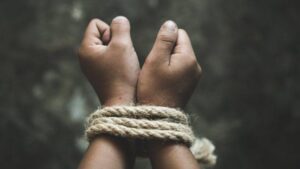Eben Enasco Reporting.
Edo State, known for its rich cultural heritage and historical significance, is currently grappling with a new and daunting challenge: a wave of kidnappings that has left residents, road users and commuters in fear and uncertainty.
The recent surge in abductions has not only shaken the local communities but also raised serious questions about the state’s ability to protect its citizens.
Although the incumbent government has made some efforts with all sense of purpose, there are still stones left unturned.
Today, Ologbo in Ikpoba Okha, Benin Akure Road, Iyanomo community, Sobe road in Owan locality, are typical of no-go areas where Kidnapping activities have predominantly eroded peace and stability.
If the constitution promotes citizens protection as a priority for elected officials of government, and can’t offer this clinically, then it amounts to failure of such government in place.
Edo state and other parts of the Country have become a product of failed government when it comes to securing the lives of the people.
Thousands of Nigerians are killed everyday like flies, yet the only thing that worries an elected government is how to campaign and retain its seat in 2027.
A government at all levels should be judged with relevant security measures put in place to secure its people.
Government policies should not only mean building health care facilities, Road Infrastructure, Educational Infrastructure, and social friendly initiatives.
But if the government fails to secure the people, who will then use these facilities and infrastructure?
Who will the government inform that such projects, including the ongoing flyover and other proposed projects are available for its use?
Is it those that have been kidnapped and killed in some instances where they cannot meet the targeted ransom charges by their abductors, that will use the Flyover or the new roads being constructed by the government?
I know that some mushroom naysayers who have been calling for the head of the author will never agree with this sentiment.
But trust me, there’s no way a member of their families including family members of the elected government of the day will not be involved in plying routes where kidnappings happen around the state.
It could happen to any of their relatives unannounced, but we all have our breakfast in different areas.
The impact of these kidnappings goes beyond the immediate fear and trauma inflicted on the victims and their families.
It has broader implications for the social and economic fabric of the state.
Businesses are suffering, investment is being deterred, and the overall sense of security that is essential for societal progress is being eroded.
There are tens of police stop and search road blocks around the city center, where some are only concerned about offering monetary support to the operating officers.
The so-called Edo State Local security officers are worse off, they beg road users and commuters like weeping babies over money for water while they dump their priorities. It is now a daily occurrence.
The situation demands urgent and effective action from the authorities.
Strengthening security measures, improving intelligence gathering, and ensuring swift justice for perpetrators are critical steps that need to be taken.
Moreover, community engagement and cooperation will be vital in tackling the root causes of these crimes and preventing further incidents.
Kudos to the Police formation in Edo state who lately launched a Community Safety Partnership To Boost Security Collaboration.
According to the Edo State Commissioner of Police, CP Monday Agbonika, the initiative seeks to strengthen collaboration between the police, community stakeholders, and religious institutions in tackling crime and enhancing public safety across the state.
In his keynote address, CP Agbonika said the Partnership would serve as a platform for building trust, identifying security challenges, and working with citizens to design lasting solutions. He stressed that policing must go beyond enforcement to include consultation, communication, and cooperation with the communities being served.
He added that continuous dialogue with community representatives would reduce fear of crime and improve quality of life in Edo State.
Religious leaders welcomed the initiative, pledging support and highlighting the role of faith-based organizations in fostering tolerance, mediating conflicts, and assisting victims of violence.
In all these projections, the police force must encourage clarity on how findings from the annual audits would be communicated to the public and how transparency would be ensured in implementing action plans.
For Edo to rise, shine and fulfill its potential, the safety and security of its people must be prioritized not vindictive governance.
The government, along with the citizens, must work together to create an environment where everyone feels protected and valued.
Only through collective effort can the state hope to overcome this challenge and continue on its path to progress and development.

